Photographs: Mukesh Gupta/Reuters. Brijen Puri
A stabilising Europe, continued quantitative easing (QE) by the major central banks, correcting commodity prices, a new-found political resolve to pursue reforms, falling inflation, large portfolio flows...the recent conditions have been as favourable for the Indian rupee as could have been wished for.
Yet, instead of appreciating towards the 52-level, the rupee has been testing all-time lows of 57, as in mid-2012 in a diametrically opposite backdrop.
The reasons for this incongruous move can be found in the fundamental drivers of the rupee in the recent past.
...
Any rally in rupee will be short-lived
Image: Women stand next to a shop selling garlands made of Indian currency notes.Photographs: Mukesh Gupta/Reuters
For the past few years, India has been struggling with high inflation coupled with a marked slowdown in growth rates.
This narrowing growth differential and widening inflation differential vis-a-vis our trading partners has been putting upward pressure on the real value of the rupee, building up a corresponding tendency to weaken in nominal terms.
India needs to sort out its investment paralysis, address supply side constraints and get its fiscal situation in order.
That would enable it to revert to its higher growth path in a benign inflation setting. Until then, the weakening bias of the rupee would continue to simmer.
...
Any rally in rupee will be short-lived
Image: A shopkeeper counts Indian currency notes inside his shop in Jammu.Photographs: Mukesh Gupta/Reuters
Emerging markets (EM), including India have been large beneficiaries of global monetary easing.
The search for yield in near-zero global interest rates has helped India fund its burgeoning current account deficit (CAD) through debt flows (both loans and portfolio investments).
If global central banks were to start weaning the markets away from this monetary morphine, the withdrawal symptoms would be severe.
The impact of this dollar strengthening would be felt acutely by countries like India that are running large CADs funded by the relatively more unpredictable portfolio flows and short term loans.
...
Any rally in rupee will be short-lived
Image: An employee arranges Indian currency notes at a cash counter inside a bank in New Delhi.Photographs: Mukesh Gupta/Reuters
A preview of this scenario played out recently, where the currencies of EM countries running large CAD (including the rupee) weakened disproportionately compared to their EM peers with current account surpluses in response to the pronouncements of various Fed governors.
Until India addresses the trade imbalance and shifts its funding mix away from short-term foreign institutional investor inflows towards long-term foreign direct investment, the eventuality would continue to weigh on the rupee.
Over the long term, there is hope politicians would appreciate the fact that good economics can be good politics would enable the country to take the hard decisions required to address the endogenous macro challenges.
...
Any rally in rupee will be short-lived
Photographs: Nguyen Huy Kham/Reuters
In the short term however, neither the government nor the Reserve Bank have many quick-fix policy bullets left in their arsenal leaving the rupee vulnerable to exogenous shocks.
The rupee's best chance at a small bout of appreciation was in May-July this year coming off a 'risk on' global environment and an improving local environment.
It missed the bus. The hope in the near term is that the talk of a strong US recovery and consequent stimulus paring turns out to be a false start, giving India the additional time required to make the requisite macro adjustments.
In the absence of that, while a temporary correction towards 55 is possible, it would only be a short-lived breather en route to new lows approaching 60 by the year end.

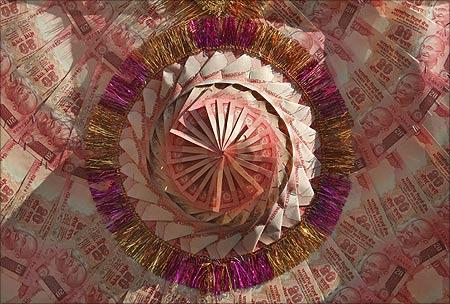
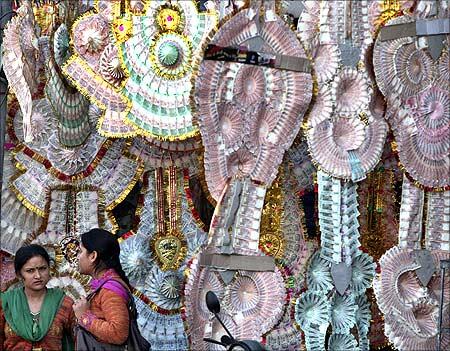
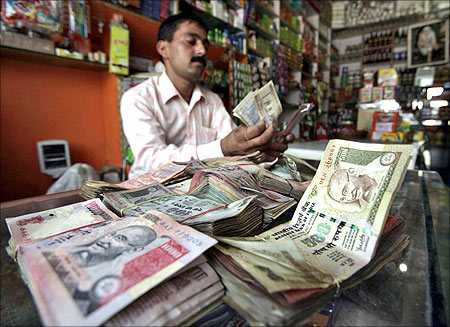
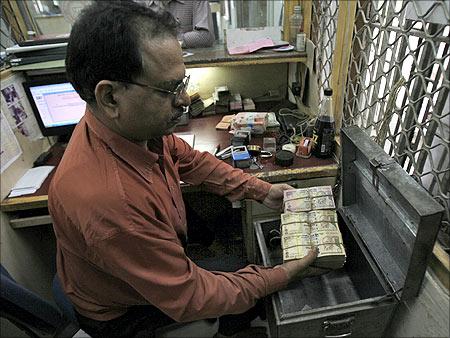
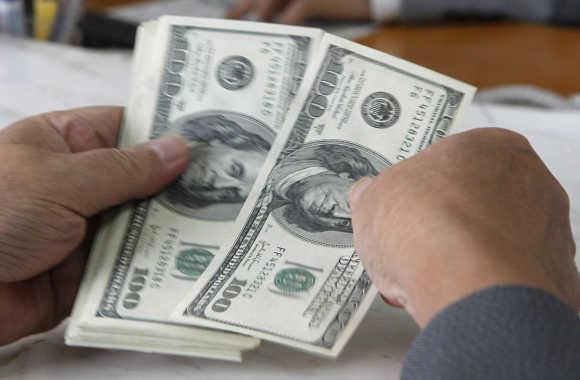

article